Admin
[STATE HOUSE PRESS RELEASE] President Tinubu Appoints New Coordinator For The Hydrocarbon Pollution Remediation Project
President Bola Tinubu has approved the appointment of Dr. Olufemi Adekanmbi as the new Project Coordinator for the Hydrocarbon Pollution Remediation Project (HYPREP).
Dr. Adekanmbi is a former Commissioner for Special Duties, Culture and Tourism in Ondo State, and a member of the Nigerian Environmental Society (NES).
He holds a Doctorate degree in Environmental Management.
The President anticipates the exercise of competence, dedication, and professionalism in fulfilling the mission of the HYPREP to restore and revitalize communities impacted by hydrocarbon pollution, with a primary focus on Ogoniland in Nigeria.
Chief Ajuri Ngelale
Special Adviser to the President
(Media & Publicity)
[STATE HOUSE PRESS RELEASE] President Tinubu Appoints New Director-General Of The National Productivity Centre
President Bola Tinubu has approved the appointment of Mr. Baffa Dan Agundi as the new Director-General of the National Productivity Centre (NPC).
Mr. Dan Agundi is a former majority leader of the Kano State House of Assembly. He was also Principal Registrar of the Kano State High Court of Justice.
The President anticipates the Director-General's utmost dedication and patriotic zeal in driving the Centre's mandate of developing a national culture of excellence in operational efficiency and institutionalizing a performance-driven orientation toward measurable productivity in the citizenry for the overall enhancement of service delivery and quality of life across the nation.
Chief Ajuri Ngelale
Special Adviser to the President
(Media & Publicity)
[STATE HOUSE PRESS RELEASE] President Tinubu Appoints New Director-General Of The Nigeria Hydrological Services Agency
President Bola Tinubu has approved the appointment of Mr. Umar Ibrahim Mohammed as the new Director-General of the Nigeria Hydrological Services Agency (NIHSA).
Mr. Mohammed is an architect, and also, a construction technology and environment professional.
The President expects improved outcomes in the agency's objective of operating and maintaining hydrological stations nationwide, as well as carrying out groundwater exploration and monitoring using various scientific techniques in order to provide hydrological and hydrogeological data needed for planning, design, execution and management of water resources and allied projects.
Chief Ajuri Ngelale
Special Adviser to the President
(Media & Publicity)
[STATE HOUSE PRESS RELEASE] President Tinubu Appoints New Director-General Of The National Directorate Of Employment
President Bola Tinubu has approved the appointment of Mr. Silas Agara as the new Director-General of the National Directorate of Employment (NDE).
Mr. Agara is an entrepreneur and sports administrator who previously served as the Deputy Governor of Nasarawa State.
The President anticipates an overhaul of the NDE for optimal performance in designing and implementing programmes to combat mass unemployment.
Chief Ajuri Ngelale
Special Adviser to the President
(Media & Publicity)
[STATE HOUSE PRESS RELEASE] President Tinubu Congratulates New Olubadan On Coronation
President Bola Tinubu extends his warm congratulations to Oba Owolabi Olakulehin on his coronation today, July 12, 2024, as the 43rd Olubadan of the ancient city of Ibadan.
President Tinubu joins the family of the new Olubadan, Ibadan citizens, the Oyo State Council of Obas, and the Oyo State Government to celebrate Oba Olakulehin on his ascension to the revered throne of his forebears.
The President affirms that Oba Olakulehin brings to the throne immense wisdom, experience, character, and strength, and urges the monarch to use the highly esteemed stool of Ibadan to advance the peace, security, and development of the area.
President Tinubu assures the new Olubadan of his support and wishes him success as he works to promote and preserve the culture and traditions of the ancient city.
The President also congratulates Ibadan indigenes on the peaceful succession process and prays that the peace, beauty, and renown of Ibadan will abide always.
Chief Ajuri Ngelale
Special Adviser to the President
(Media & Publicity)
[STATE HOUSE PRESS RELEASE] President Tinubu Sympathizes With Victims Of Tragic Building Collapse In Plateau State
President Bola Tinubu receives the news of the tragic collapse of a school building, which resulted in multiple deaths and many surviving victims in Jos, Plateau State, with profound grief.
President Tinubu describes the unfortunate incident as a huge loss to the nation, as well as a devastating development - too excruciating to imagine.
The President condoles with the bereaved families, families of all the victims, and the people and Government of Plateau State.
President Tinubu commends emergency responders, the National Emergency Management Agency (NEMA), State Emergency Management Agency (SEMA), security agencies, and all citizens involved in the search, rescue, and resuscitation efforts.
The President assures the people of Plateau State of his fervent support at this difficult time.
Chief Ajuri Ngelale
Special Adviser to the President
(Media & Publicity)
[OPINION] Correcting Dr. Olisa Agbakoba’s Assertions - Kingsley Ariamaodo
Eminent lawyer and Senior Advocate of Nigeria, Dr. Olisa Agbakoba, has lately been calling for the repeal of the Petroleum Industry Act 2021 which is within his rights as a citizen. But in doing so, he has been making some assertions regarding the status and operations of the NNPC Ltd that are not quite true.
This is not an attempt to join issues with him. It is just to set the records straight, knowing that when falsehood is left unchallenged, it is accepted as the truth.
One of the key reasons he claims to be calling for the repeal of the PIA is that under it, NNPC Ltd is playing the roles of an operator and a regulator. When pressed to be specific on the regulatory roles being performed by the NNPC Ltd, he listed “fixing prices of petroleum products” and “acting as sole importer of petroleum products”.
The truth, however, is that the PIA does not have any provision that makes NNPC Ltd a regulator in the oil and gas industry. The PIA specifically provides for the establishment of two regulators in the industry. They are: The Nigerian Upstream Petroleum Regulatory Commission (NUPRC), and the Nigerian Midstream and Downstream Petroleum Regulatory Authority (NMDPRA).
One of the objectives of the reforms that the PIA was designed to bring about was the scrapping of the dual roles of operator and regulator played by the NNPC as a government Corporation. Since the PIA came into force in 2021 and the consequent transition of NNPC into a limited liability company that operates under the Companies and Allied Matters Act in 2022, the Company has ceased to take on any regulatory role in strict compliance with the law.
Contrary to the learned Senior Advocate’s claim that NNPC Ltd fixes prices of petroleum products, the Company does not fix prices. In fact, no agency or entity unilaterally fixes prices of petroleum product as the PIA in Sections 205, 206 and 207 provides for a deregulated market which is currently in operation in the Downstream Sector. Under the deregulated market, every marketer is allowed to determine the price of its products as it deems fit, taking market forces into consideration. Based on this principle, NNPC Ltd through its Downstream subsidiary, NNPC Retail Ltd, fixes the prices of its products. It does not fix prices for the entire market as other marketers are at liberty to set their own prices based on market realities. This is the reason NNPC Retail stations in Abuja sell Premium Motor Spirit (PMS) at N617 per litre while other marketers sell at various prices. Similar conditions prevail across the country with different marketers selling petroleum products at different prices. If the sector was still regulated, it would be the duty of the NMDPRA to fix prices and not NNPC Ltd as a player in the industry.
On the claim that NNPC Ltd is the sole importer of petroleum products, this is also not true. Other marketers import AGO and ATK (diesel and aviation fuel). The reason they are not able to engage in the importation of PMS has to do with foreign exchange issues. But the PIA, apparently envisaging situations like this, provides that NNPC Ltd should serve as a supplier of last resort to guarantee energy security. This is very explicit in Section 64 of the PIA. That is the reason NNPC Ltd is currently the sole importer of PMS (not all petroleum products), and that does not in any way make it a regulator.
NNPC Ltd has since moved on to assume its statutory role as a commercial operator in the entire value chain of the energy industry. It has further sealed its status as a commercial operator with declaration of ₦2.52 trillion and ₦674 billion profit after tax in 2021 and 2022 respectively.
We believe that even if other members of the public, out of ignorance, still see NNPC Ltd as a regulator based on its previous operations pre-PIA, it should not be a learned silk like Dr. Agbakoba who should be familiar with the law.
Mr. Ariamaodo, writes in from Abuja.
[ZOOM MEETING] CITY TALKS WITH REUBEN ABATI: Supreme Court ruling on Local Government Autonomy - Mutalubi Ojo Adebayo
Programme: CITY TALKS WITH REUBEN ABATI
Time: 12:00pm
Guest: Mutalubi Ojo Adebayo, SAN
Topic: "Supreme Court ruling on Local Government Autonomy."
Date: 13th July, 2024
Join Zoom Meeting
https://zoom.us/j/92877141732?pwd=VEJWb29OL2VVekZUTHRpdWYxK0xxZz09
Meeting ID: 928 7714 1732
Passcode: 600206
Many trapped as Abuja building collapses [Photos]
A section of a two-storey residential apartment collapsed in Abuja on Saturday morning, with several people trapped in the rubble.
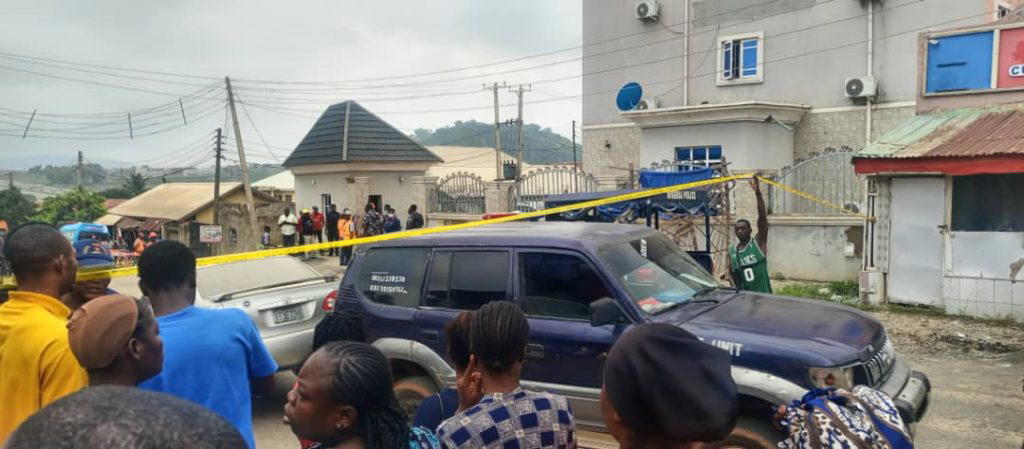
While emergency responders and security personnel were on ground, rescue efforts were hampered as the cranes needed for the rescue were yet to arrive as of 8:45 am, nearly two hours after the incident.
Vanguard gathered that two persons had, however, been rushed to a nearby hospital, while a few others escaped on their own.
One of the escapees who did not want to reveal her identity said that when she woke up around 7 a.m. and came out of the house, she began hearing some cracks and then ran out.
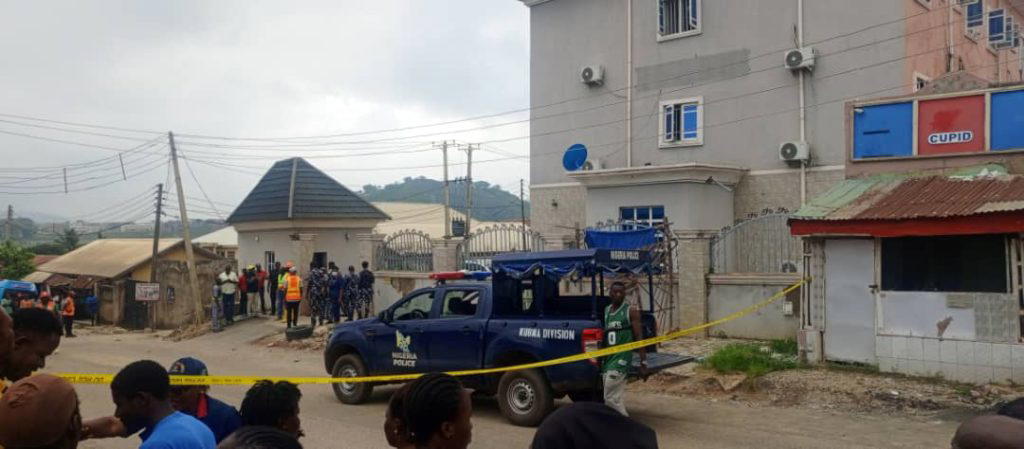
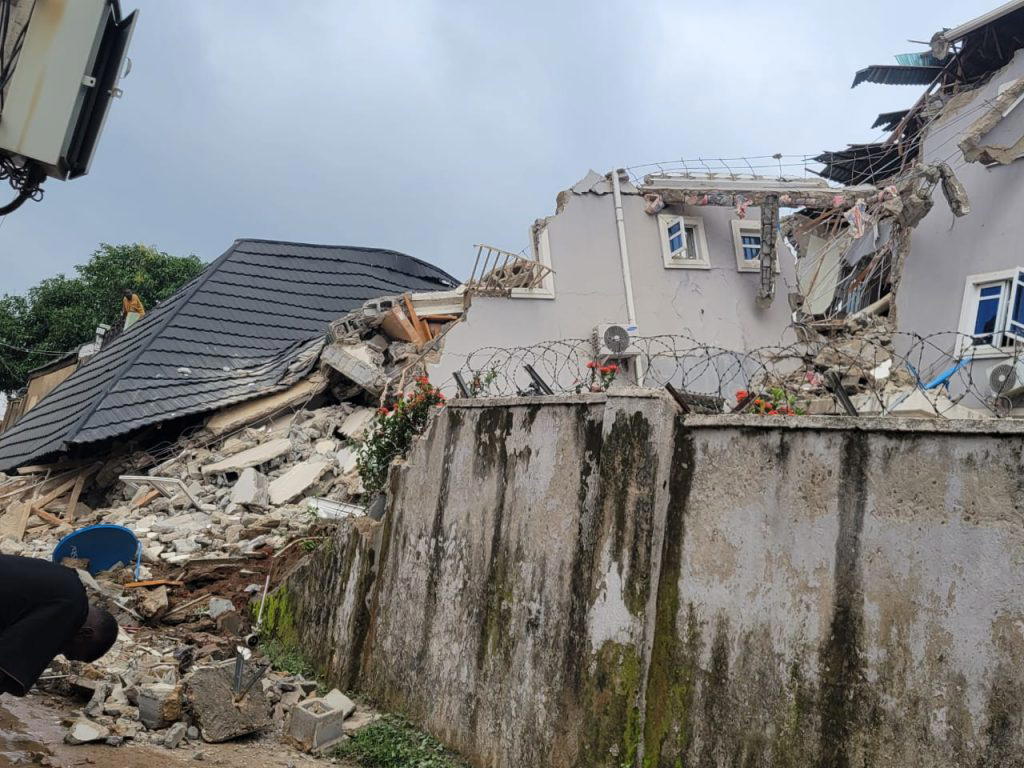
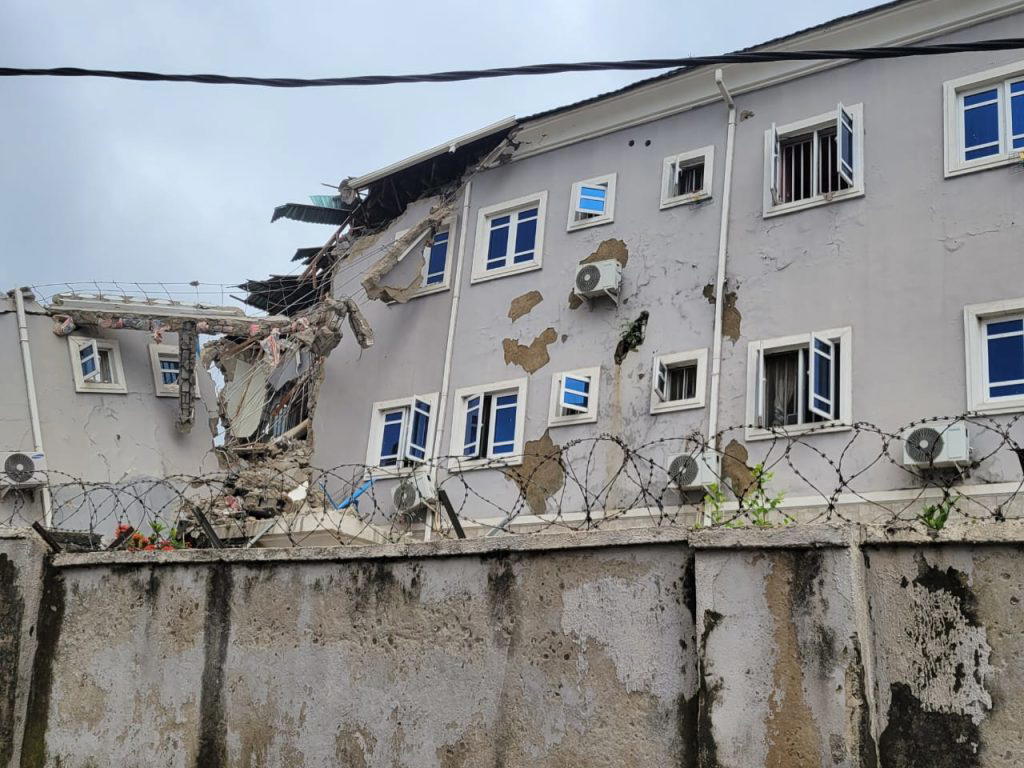
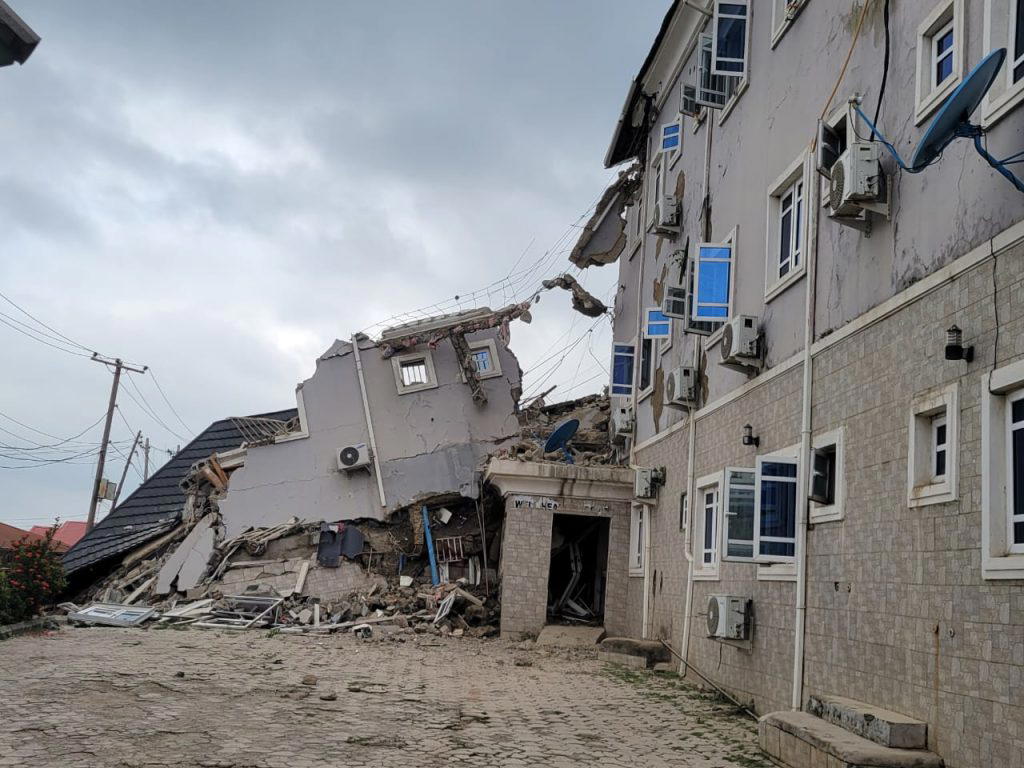
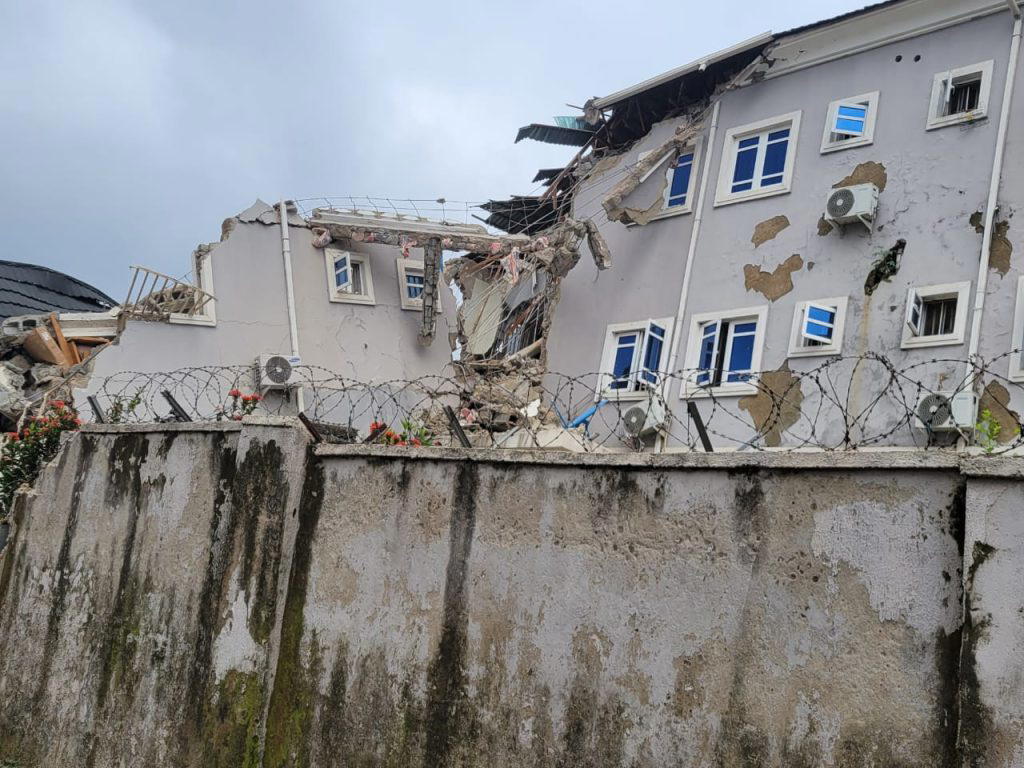
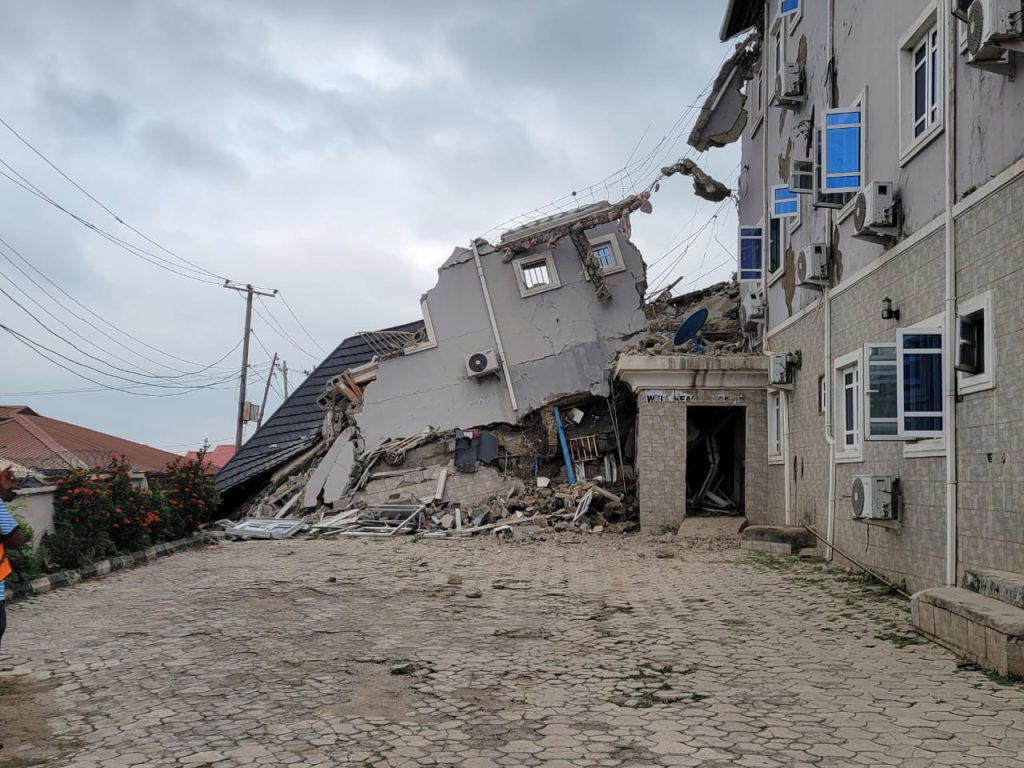
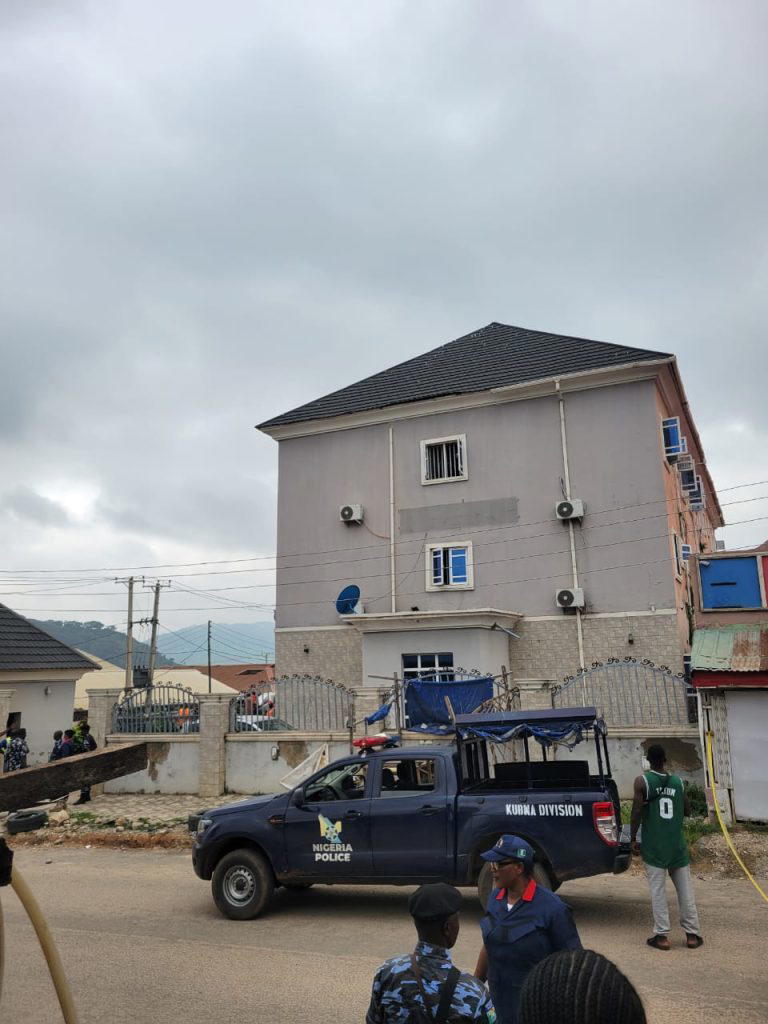
Details later…
[Vanguard]
[OPINION] Tribute to WS at 90 - Kayode Fayemi
The name Wole Soyinka aka WS evokes sundry emotions across the spectrum. Regardless of where one stands on the spectrum, we can all agree that Wole Soyinka is one of Nigeria’s most celebrated personalities, certainly Africa’s most iconic literary maestro and one of the world’s most influential citizens. Even though I know him to treat public celebrations of his birthdays with studied indifference and a hunter’s disdain, it is still almost unbelievable that WS is 90, given his frenetic pace of work and travels. And whether he likes it or not, this is one celebration he cannot stop!
For me, WS is not the unfathomable mystery that many perceive from a distance and he is not the mythological pantheon that exists in the realm of the gods in the imagination of many. He is a mentor, a role model, a father figure and a thought-leader with whom I have had the rare privilege of communing and sharing great moments of significant historic importance in my life.
My first physical encounter with Professor Wole Soyinka was in 1994 in the course of the struggle to return Nigeria to democratic order. My familiarity with WS however preceded our opportune encounter. My first interaction with him was in his prison notes, The Man Died which I first struggled to grasp in 1975. While the motif of the book was a seductive topic of interest, the inscrutably elevated language and discursive point of view of the book made it a hard nut for me to crack at such a young age. Since then, I have not only read all his other writings I have come across – particularly the autobiographical series – Ake, Isara, Ibadan: the Penkelemes Years and You Must Set Forth at Dawn, I have gobbled them with obsessive enthusiasm. His writings and public advocacy for good governance, social justice, democracy and freedom had always made him a godfather and mentor whose association I had deeply coveted.
Consequently, when the opportunity to meet Prof happily came my way through his son, Olaokun in 1994, it was a dream come true. Professor Soyinka (who was already familiar with my work as a democracy activist in the UK through the activities of the New Nigeria Forum and its journal, Nigeria Now which I edited and regularly sent to him in Nigeria), seized the opportunity of our meeting to invite me to be part of his newly established National Liberation Council of Nigeria (NALICON) as Director of Communications.
Without giving it much thought, I enthusiastically jumped at the rare opportunity to work closely with Africa’s first Nobel Laureate in literature. I had reasoned that his international reputation, connection and clout would greatly enhance our struggle for the return of democratic order in Nigeria. And I reasoned right! As I indicated in my memoir of the exile years, “I came close to being labelled a passionate enthusiast and defender of the Soyinka mystique, especially having shared his worldview of the Nigerian struggle as one between authoritarianism and democracy, and not purely an ideological fixation between socialism and capitalism” (Fayemi, 2005:210). Throughout his time in exile in the 1990s, I worked closely with him on numerous projects in NALICON and the United Democratic Front of Nigeria(UDFN) along with several other patriots – the most popular of which was the underground opposition radio – Radio Freedom, later Radio Kudirat.
There is no doubt that I have always shared an ecumenical ideology and kindred spirit with Kongi. His natural spur to resist oppression, instinctive spontaneity to defy authoritarianism and his impregnable commitment to civil liberty makes him a natural inspirational mentor. In both the youthful and sagely Soyinka, has been a consistent resurgence against brutality and inordinate absolutism. As he often opines, “justice is the first condition of humanity”. His resentment against state terror and abuse of power burns like the inferno of the mythical Hades.
For WS, humanity and its happiness are the tunnels through which he travels his mind in the visualisation of social problems. Anything that denies man his inalienable rights, is for Soyinka, an abhorrent act that must be condemned in the strongest terms. He is predictably obdurate and conscientiously unapologetic for his repetitive fidelity to the triumph of human freedom, primacy of his liberty and elevation of his essence as the sole creed that all gods must serve.
His temperament rejects every iota of practices that suborn human happiness. Even in his old age, he continues to prick the conscience of the nation with penetrating homilies that poke a revelatory finger in the nose of public decadence. WS is that bitter remedy that purges a poisoned belly of its troubling constipation. His corrective words are like the surgical knife that cuts out the malignancy of a petulant lesion. He refuses to suffer fools gladly and would rather be misunderstood by people too thick to decode his angst against all governmental decadence.
He is classical in all aspects of his artistry. For some and for his obscurantism, he is the African Homer; some others say he is the ultimate Aristophanes; some even think he is the rebirth of Socrates and not just for the accident of initials, WS is our own William Shakespeare and John Milton rolled into one. He is the agglutination of literary reincarnation of the best that history can recall.
Like his ancestral forebears, WS untiringly rages against the foibles of governmental chieftains and their foreboding delinquencies. He has spoken vehemently against the cowardice of intellectual ambiguity that continues to indulge venal characters in public places. For him, no space must be yielded to the debauchers who gorge the nation’s wealth and fritter its assets in the realisation of their gluttonous hedonism.
Soyinka is impatient with the loud silence that punctuates clear cases that should strike a thunder of a mass anger. For him, until the obscurity of silence gives way to visibility of voices, any unexplained figuration about the existence of Nigeria will remain an empty indoctrination that serves the hypocritical cowardice of the nation’s power barons.
Soyinka is a patriot who has used his innate talent to serve humanity at every opportunity. His radical posture has come handy in dangerous times when only persons of sterner stuff could stand. In 1967, he was imprisoned because of his audacious antagonism to the genocidal assault that the civil-war represented. Before then, he had intruded a radio station in Ibadan in 1965 to frustrate the broadcast of an electoral heist that was meant to entrench an unpopular government. The “Man” lives in Soyinka like the ageless Olumo Rock. His stout courage, broad repository and undeniable conviction radiates his writing in plays, fictions, poetry, essays and public interventions. He uses the power of words to carry out corrective surgery and as a righting atonement for the transgressed. When he chooses his object for critical scrutiny, he deploys the elegance of humour and the pettiness of satire to disrobe the social psychopaths wherever they might be.
Soyinka is spiritual but not religious, ideological but not bigoted; for, he could not submit his intellect to the whimsical machinations of another being. He acknowledges, as he found out through his teacher, Bonany Dombree, that all spirituality sprouts from the relationship between nature and man and that the quest to create a meaning for its inscrutable foundation gave expression to the concept of deity. Thus, Soyinka’s spirituality is in the primacy of humanity and the pursuit of universal egalitarianism; this, I think, is the basis upon which his ideas of the ideal is anchored. No wonder he remains a respectable voice for human advancement in the global arena.
Even though Professor Soyinka has been an “unsuccessful” politician in the narrow manner success in politics is defined in our clime, his contribution to the political development of Nigeria is undeniable and inspiring. Apart from constantly being in the trenches for the enthronement of democracy and rule of law, he has floated a political party in the past to advocate a set of political ideas that he believed could provide an alternative answer to Nigeria’s predicament. More importantly, Professor Soyinka has been one of the moral giants who continue to point the nation to the path of rectitude in politics, constitutionalism, justice, equality and good governance. His life has been a watershed and a blessing in every aspect.
I have been a beneficiary of WS’s generosity in innumerable ways for which I owe him a great deal of gratitude, not just for writing a rare Foreword to my 2005 exile memoirs, Out of the Shadows but also for his unflinching support when I chose the partisan political route. He kept a regular watch on my political journey and was quick to commend my edifying strides in office whilst also upbraiding me whenever he found any untoward development difficult to fathom. He honoured me with the commissioning of the iconic Ekiti Government House in 2014.
At 90, WS reminds me of those unforgettable lines in Alfred Tennyson’s Ulysses:
Old age hath yet his honour and his toil;
Death closes all: but something ere the end,
Some work of noble note, may yet be done,
Not unbecoming men that strove with Gods.
The lights begin to twinkle from the rocks:
The long day wanes: the slow moon climbs: the deep
Moans round with many voices. Come, my friends,
‘T is not too late to seek a newer world.
Push off, and sitting well in order smite
The sounding furrows; for my purpose holds
To sail beyond the sunset, and the baths
Of all the western stars, until I die.
It may be that the gulfs will wash us down:
It may be we shall touch the Happy Isles,
And see the great Achilles, whom we knew.
Tho’ much is taken, much abides; and tho’
We are not now that strength which in old days
Moved earth and heaven, that which we are, we are;
One equal temper of heroic hearts,
Made weak by time and fate, but strong in will
To strive, to seek, to find, and not to yield.
On behalf of myself and my wife – Bisi who adores him, here is wishing our timeless Nobel Laureate, an esteemed mentor and a humanist extraordinaire, a happy 90th birthday. Long live, Eniogun!
Dr. Kayode Fayemi, CON
Visiting Professor,
School of Global Affairs,
King’s College, London

![[STATE HOUSE PRESS RELEASE] President Tinubu Appoints New Coordinator For The Hydrocarbon Pollution Remediation Project](/media/k2/items/cache/905b0aa0e46a446455cb904067cb3099_Generic.jpg)
![[STATE HOUSE PRESS RELEASE] President Tinubu Appoints New Director-General Of The National Productivity Centre](/media/k2/items/cache/7a365e4b7d0db12c7358fbebc8ecc069_Generic.jpg)
![[STATE HOUSE PRESS RELEASE] President Tinubu Appoints New Director-General Of The Nigeria Hydrological Services Agency](/media/k2/items/cache/f2fcf68ec210a9209693a63e1df1d2c9_Generic.jpg)
![[STATE HOUSE PRESS RELEASE] President Tinubu Appoints New Director-General Of The National Directorate Of Employment](/media/k2/items/cache/24af28cdb9efeec200cf5db6adb01d36_Generic.jpg)
![[STATE HOUSE PRESS RELEASE] President Tinubu Congratulates New Olubadan On Coronation](/media/k2/items/cache/38dfa7ab09c0f9a955f1215933267933_Generic.jpg)
![[STATE HOUSE PRESS RELEASE] President Tinubu Sympathizes With Victims Of Tragic Building Collapse In Plateau State](/media/k2/items/cache/b69bb25ada525b16829a996ebd868fbc_Generic.jpg)
![[OPINION] Correcting Dr. Olisa Agbakoba’s Assertions - Kingsley Ariamaodo](/media/k2/items/cache/45226abf705633b93bab86f0f90f16cc_Generic.jpg)
![[ZOOM MEETING] CITY TALKS WITH REUBEN ABATI: Supreme Court ruling on Local Government Autonomy - Mutalubi Ojo Adebayo](/media/k2/items/cache/2ca840a0a63a85f1e28074318bb39b8e_Generic.jpg)
![Many trapped as Abuja building collapses [Photos]](/media/k2/items/cache/dbf2196269b175f2b32f6088192a36b1_Generic.jpg)
![[OPINION] Tribute to WS at 90 - Kayode Fayemi](/media/k2/items/cache/b9f4d7679d137bd91e667cab7be624a1_Generic.jpg)